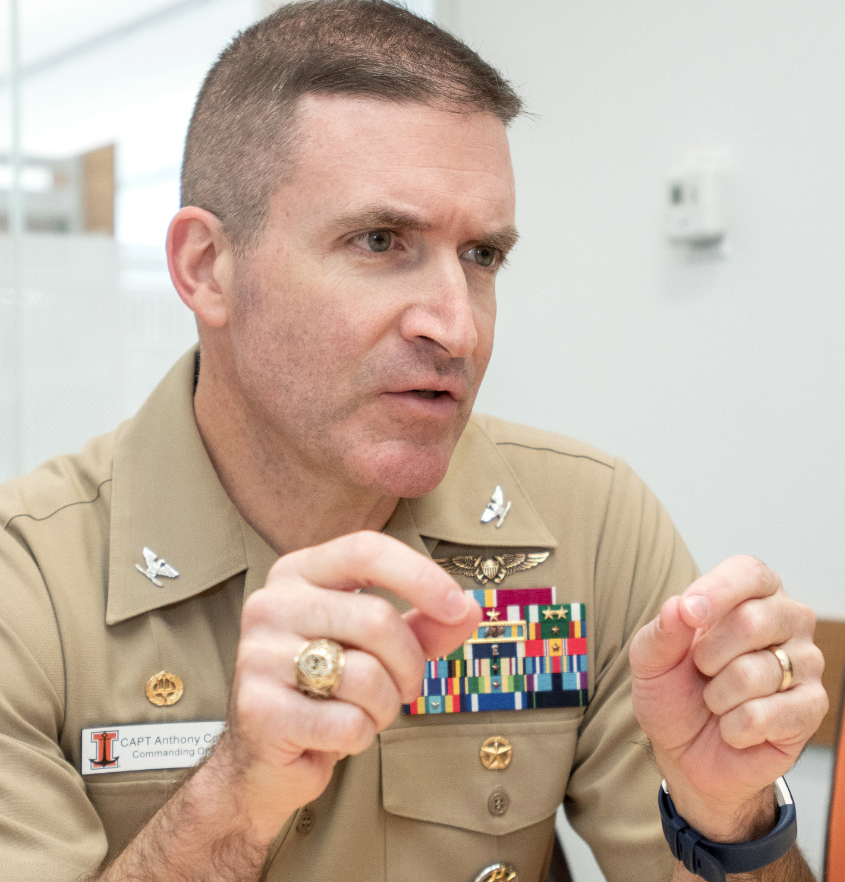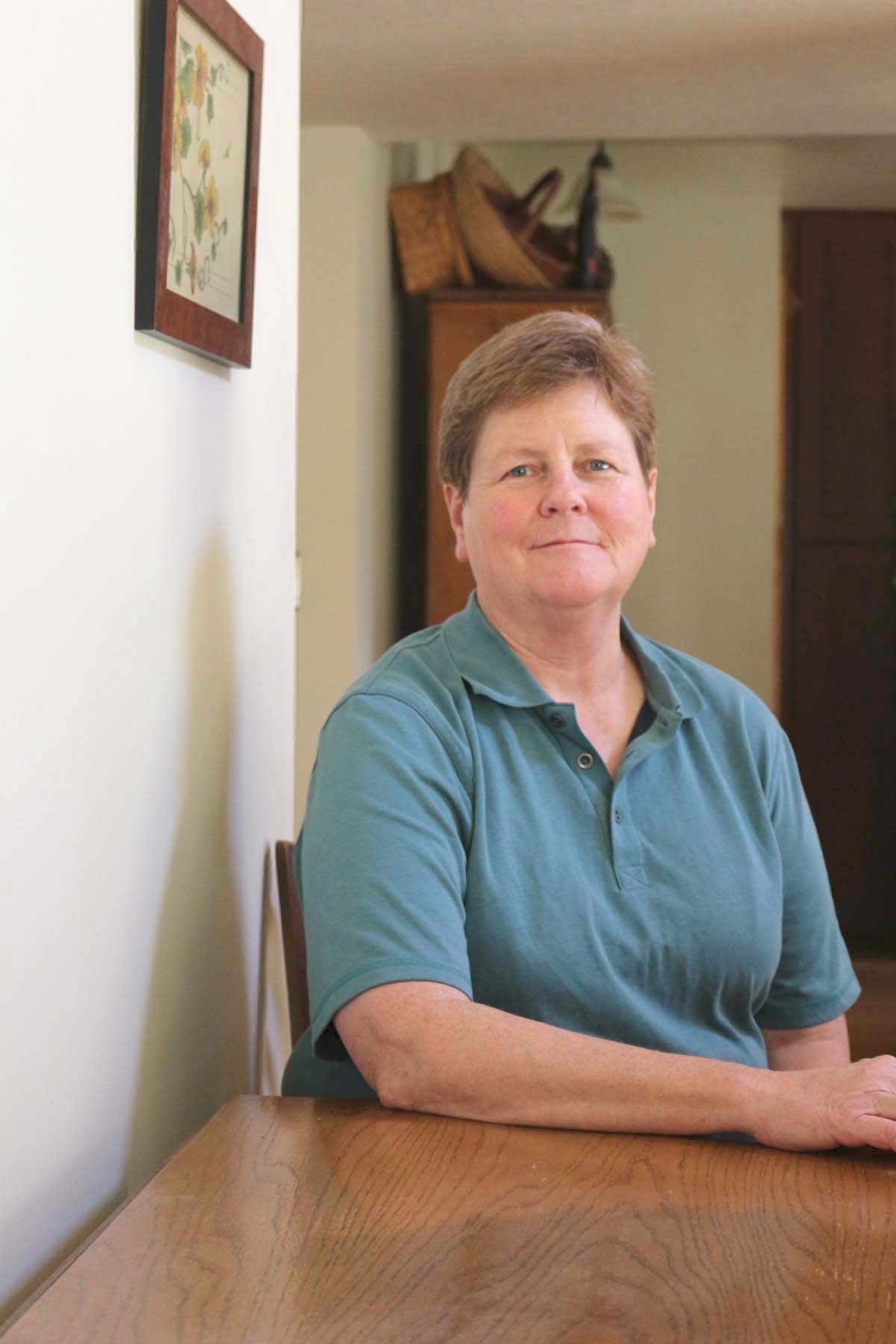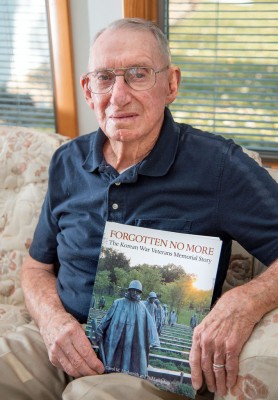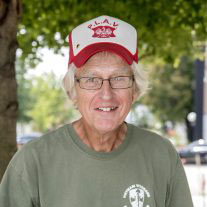Anthony Corapi
By Paul Wood

Photo By Rick Danzl
CHAMPAIGN — Flying around the world as a Navy navigator, Capt. Anthony Corapi picked up technical and leadership skills.
Now 49, he grew up in Brooklyn and Long Island, but you can’t hear a trace of that New York accent.
“I got razzed a lot for that at the Citadel,” the Military College of South Carolina and the home of future officers. “I went in a boy and came out a man.”
He’d always known he wanted to fly, after seeing the battle film “Midway” at 8 years old.
After NROTC and an engineering degree, he was commissioned as an ensign in May 1992 and sent to Pensacola, Fla., the main air training center for the Navy, called “The Cradle of Naval Aviation.”
He’d never flown before, but, Corapi said, “if you have the aptitude, they’ll teach you.”
He was trained as a naval flight officer working as a navigator/weapons officer — think “Goose” in “Top Gun,” he said — so he didn’t have to complete the solo part of aviation training.
Then he was sent to Randolph Air Base in Texas, because the Air Force and Navy trained on similar planes.
He was winged in December 1993.
In Jacksonville, Fla., he had his first encounter with the P-3C Orion, a four-engine turboprop meant for anti-submarine and maritime surveillance.
Corapi would fly in it for much of his career.
“It’s a workhorse,” said Corapi, who also served in other planes.
Sub hunters float sonobuoys — expendable sonar systems — on the sea, listen to the microphone and triangulate for their objective.
“I dropped torpedoes in training, never in anger,” Corapi said. His time was at the waning tail end of the Cold War.
“The Chinese in the Western Pacific were replacing the Russians” as who the Navy had to surveil, he said. “Russia was the focus, China the unknown. I was deployed to Okinawa many times. I’d see those islands grown from coral reefs that could (serve) as runways.”
Early on, he had a tour from a base in Sicily, then Saudi Arabia, where his plane gathered information on vessels in the Red Sea, especially merchant ships.
Crew members slept in oil workers’ compounds.
During the Bosnian War, he was part of a group enforcing an arms embargo.
In the Caribbean, he was based in Roosevelt Roads Naval Station in Puerto Rico and participated in surveilling drug smugglers. It was the Coast Guard that tried to board the boats in international water.
“The military can’t be doing law enforcement except in unusual cases; the Coast Guard does that,” Corapi said.
His plane tracked suspicious vessels, such as speedboats loaded with barrels of fuel.
“I’m sure that for every one caught, five or six got through,” he said. “But still, we made a contribution for a good cause.”
Every tour was not in a warm spot. In Iceland, his crew searched for Russian submarines.
“In three-and-a-half years, I saw just about the entire globe,” he said. “It was everything I’d signed up for.”
He became a flight instructor in Jacksonville, first in the air, then in the classroom. “I really liked teaching.”
He was also glad to be home, because he and wife Jill were planning to start a family — three children.
After Jacksonville, he was assigned to the USS Carl Vinson, a super-carrier, based in Bremerton, Wash.
“It was an amazing tour, navigating a 98,000-ton aircraft carrier,” he said. “Looking up at the ship, it was so huge; two-and-a-half years later, she looked smaller.”
In July 2001, the USS Carl Vinson headed for the Strait of Hormuz, a choke point for the Persian Gulf.
A few months later, he caught a TV broadcast that looked like a movie to him. He realized it was the Twin Towers collapsing on 9/11.
Soon, “I was the officer of deck in Afghanistan as our planes launched.”
As a New York native, “it validated for me that I made the right choice to join the Navy.”
As a lieutenant commander, he held several positions, eventually heading to Washington, D.C.
“You do well, they keep giving you more to do,” he said.
At the Pentagon, he was first assigned to the Joint Chiefs of Staff, and once briefed Secretary of Defense Donald Rumsfeld and later Secretary Robert Gates.
“I marveled about how senior leaders made difficult decisions under such time pressures,” Corapi said.
He left Washington to command a squadron, worked in administration and eventually came to the University of Illinois to be commanding officer of NROTC.
Next year, he will retire and start a second career.
Do you know a veteran who could share a story about military service? Contact Paul Wood at pwood@news-gazette.com.
Read more stories from local veterans:
 Meg Miner
MANSFIELD — Meg Miner served during the Persian Gulf War, but she later had some doubts about her country’s actions. The …
Meg Miner
MANSFIELD — Meg Miner served during the Persian Gulf War, but she later had some doubts about her country’s actions. The …
 Stanley Gilles
CHAMPAIGN — Even though Stanley Gilles worked three years for Illinois Bell as a lineman before he was drafted to Korea, …
Stanley Gilles
CHAMPAIGN — Even though Stanley Gilles worked three years for Illinois Bell as a lineman before he was drafted to Korea, …
 Paul Wisovaty
TUSCOLA — Paul Wisovaty entered the Vietnam War as a John Wayne fan, but after six months “in country,” began to notice …
Paul Wisovaty
TUSCOLA — Paul Wisovaty entered the Vietnam War as a John Wayne fan, but after six months “in country,” began to notice …